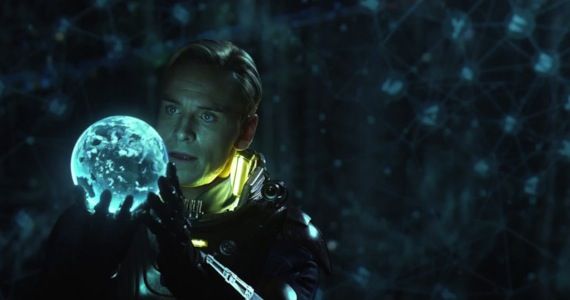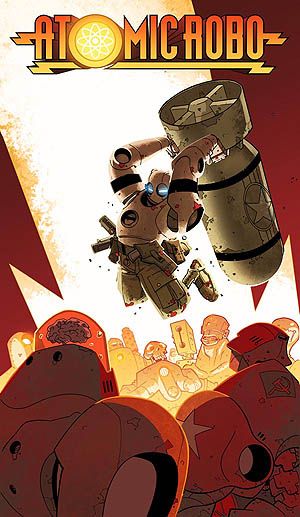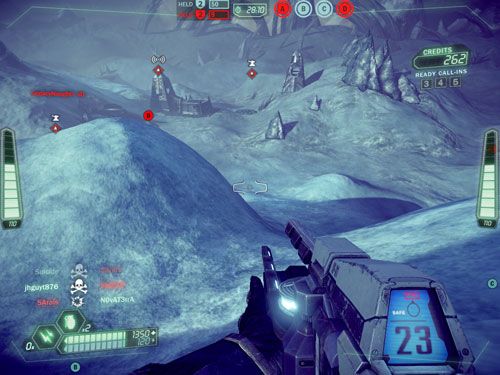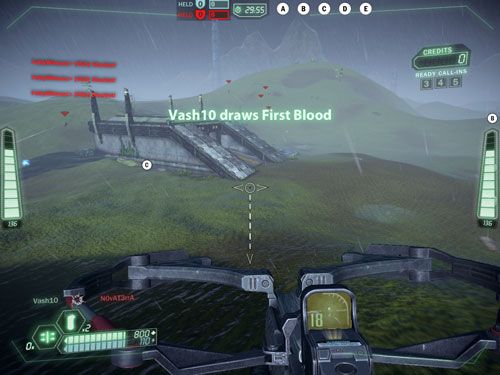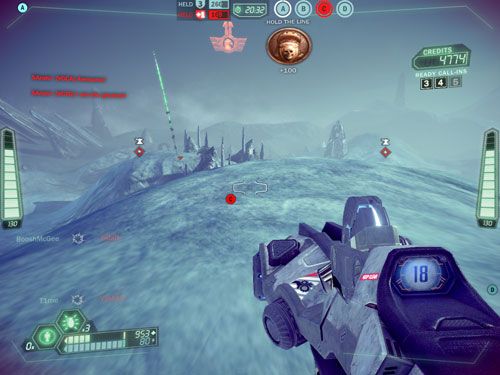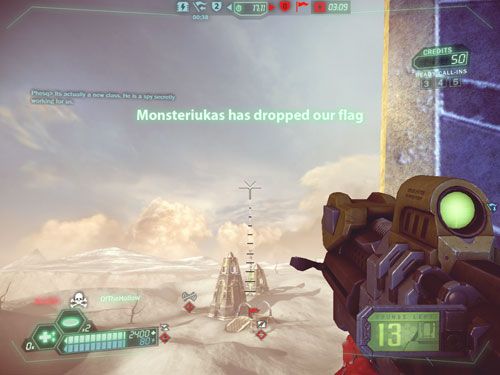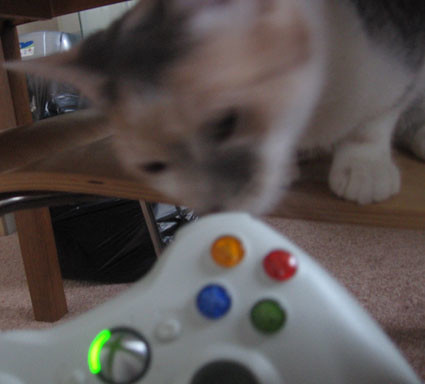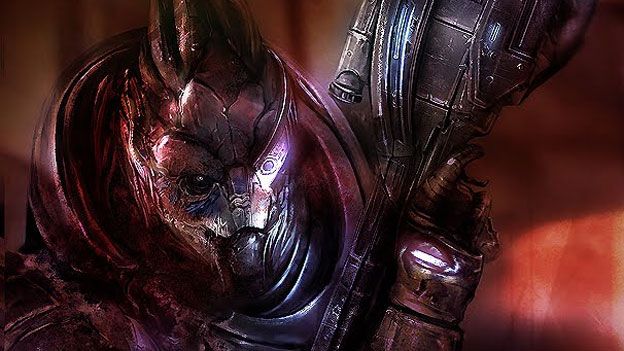
Using this picture again, because Garrus calms me down. So now is when we discuss the ending to
Mass Effect 3. I know it's been discussed and being discussed all over the Internet as I type this. One of the best articles on the subject is
over at GameFront and the
Escapist podcast gives a good slice of opinions on the subject from people not frothing at the mouth in entitled rage. Let me tackle that issue first to ensure I push spoiler material past most summary snippets. I'm as flabbergasted by the endings to
Mass Effect 3 as anyone. Moreover, I feel that at least a couple of the problems I have with them could be solved with some quick edits that leave the overall 'message' (if there is one) intact. But as much as I would like to see what I consider to be improvements applied to this conclusion to satisfy me personally, I know full well it may never happen. Just like we'll never get a truly & universally satisfying end to the Star Wars prequels, or that "other" Indiana Jones movie, or Battlestar Galactica, or LOST, or the Transformers live-action films, we may never get one for Mass Effect. Now, I'm not saying gamers shouldn't try. I'm not saying we can't be upset. The problem I have is in the way gamers are approaching it. Raising money for charity to make BioWare aware of this wide-spread disappointment is one thing, but to claim we want to "retake" it is preposterous. Mass Effect and its universe was never really ours, not entirely. It is a product of BioWare's creative minds and programming chops, and to a lesser extent, it also belongs to EA's marketing department just as much as Madden does. Yes, we add to the experience of the game by playing it, by making decisions, and by growing attached to its rich cast of deep characters. And as participants in the story, we can and should have something to say about how it ends. But we never owned it, outside of purchasing a copy of the game disc or downloading it onto our PC. There's nothing to "retake". Now. Let's talk about the actual endings. This is bound to get a bit long, so grab a drink. You may need a few, actually.
The Death Knell of Choice
Once Shepard talks The Illusive Man (hereafter referred to as TIM) into blowing his brains out in a nice if somewhat inexplicable call back to the first game, he's conveyed via magic elevator into the Crucible. There the Starchild or whatever it actually is tells Shepard (and, by extension, us), that the Reapers do not in fact slaughter organic life as part of their reproductive cycle or just because they're evil eldritch sci-fi horror-terrors. It is part of a "natural" cycle created to ultimately preserve organic life. The Reapers destroy sufficiently advanced civilizations so that they will not destroy themselves and all other life when they inevitably create synthetic life.
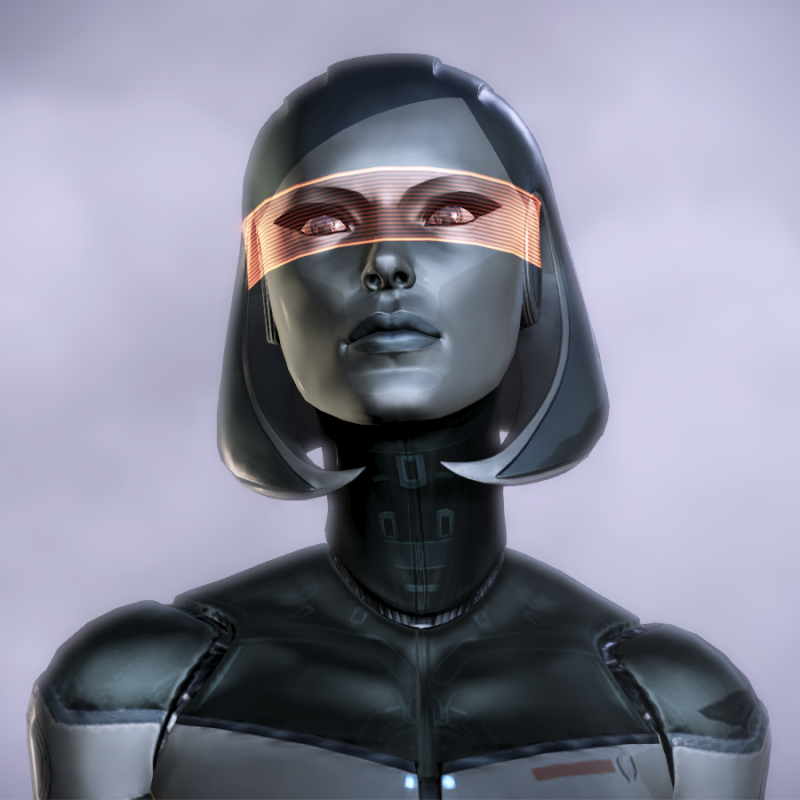
"It has been my plan all along to destroy organic life in the galaxy down to the last squirrel. Except for Jeff.
"... That is a joke." First of all, Shepard should be able to point outside the window at EDI. She's spent the entire game exploring the aspects of organic living she doesn't understand in an entirely peaceful way. And if you, like me, managed to broker peace between the Quarians and the Geth, then you have another huge example as to why the reasons for this cycle are monumentally flawed. While both races have work ahead of them to repair rifts left by racial hatred and near-genocide on both sides, the evidence exists that the peace will last, and synthetic and organic can work side by side without any sort of artificial reset button of face-melty death. Just as perplexing is the notion that this sort of wholesale slaughter is necessary to preserve lesser species. It's a given fact that organic life in general can get pretty wild. It does tend towards patterns of chaos rather than the rigid order of manufactured forms. However, imposing order on that chaos does not mean destroying it. When I want to prune a bonsai tree, I do it with tiny shears and patience, not a blowtorch. The Starchild is basically imposing SOPA on the universe with organic life taking the place of the Internet. But Shepard, beaten and half-dead, just kind of rolls with it. The Starchild presents three options: Destroy the Reapers (and, he says, all other synthetic life in the galaxy), control them (because that was such a hot idea when TIM was ranting about it all Huskified just minutes before), or synthesize synthetic life with organic life. Let's leave aside the two obvious ones and look at that last one. Instead of doing what we've been doing all game long, brokering peace and helping people overcome differences to work together towards a common goal, we are essentially forcing every individual being in the galaxy to forgo all differences to become a single, homogenized race. They are given no say in this. It all comes down to what Shepard wants. I mean, all three endings have this problem and the word choice of the kid in the stinger calling him "
the Shepard" seems to indicate this messianic overtone carried over into whatever life survives this idiotic illusion of choice. I say "illusion" of choice because they are all essentially the same. All three endings end the same way. The Reapers are dealt with, the mass relays are destroyed, and the Normandy struggles to outrun an explosion. I'll deal with those last two later. Stepping back and looking at the endings from a broader perspective, we see that the only true difference is a swap of colors and a few different graphical assets. The original
Mass Effect only swapped dialog lines, it's true, but those lines and choices actually had an impact on the games the followed. The finality of these endings, however, precludes any sort of feeling that we made that big a difference. We see nothing of what our teammates after those last moments on Earth. There's no way to know how the galaxy reacted to its fate. There's no closure. It's an ending instead of a conclusion, an abrupt and forced truncation of the story of Shepard that leaves the player empty and unsatisfied.
The Indoctrination Theory
If you take a closer look at this, carefully prying up the cow patties BioWare seems to have left all over their trilogy, evidence exists of something deeper going on. Several sources on the Internet have pieced together moments and snippets of lore throughout all three games to put together the following theory. To me, it's a bit of a stretch, but not much. Since the very first
Mass Effect, we've known that one of the most insidious weapons in the arsenal of the Reapers is the process known as "indoctrination". An individual of sufficient power or influenced exposed to the Reapers begins to come around to a way of thinking not necessarily their own. Their reasoning seems sound and logical to them, but to the outside observer it's clearly flawed, even dangerous. This influence is pervasive, creeping into the thoughts and dreams of the target often without their knowledge. This is called indoctrination. It happened to Saren. It happened to TIM. And some say it happens to Shepard.
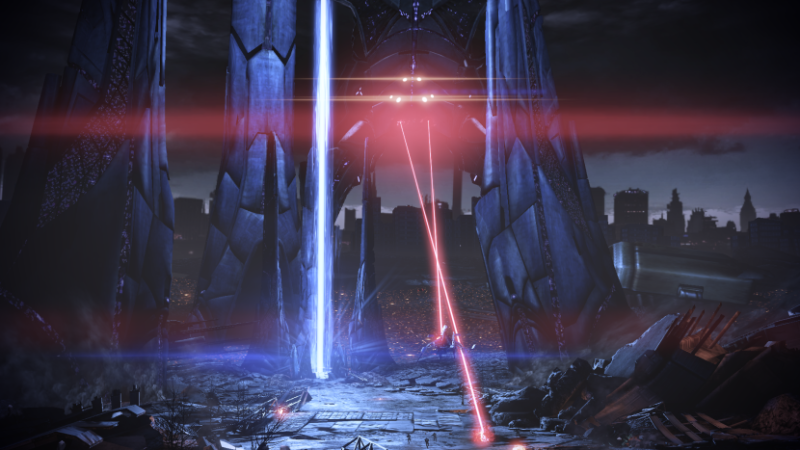
After all, Harbinger's thing has always been to assume direct control... The VI taking the form of a little boy Shepard failed to save in the prologue doesn't make much sense even in the rather dumb "a form you can understand" explanation given in things like
Contact. At least Q from
Star Trek: The Next Generation used human perceptions of him to make various points or play some pranks. The Starchild, though, isn't just present at the end. Shepard sees the sprog in nightmares throughout the game. And the nightmares, while carrying the voices of lost comrades and the cries of the dying, also are possessed of an inky blackness that pervades them, just as inky black tendrils try to creep into Shepard's perceptions during his showdown with TIM. The evidence doesn't stop there, according to this theory. Consider the "choices" offered. Two of the three of them end with Shepard dead and the Reapers alive. In synthesis they exist in a new form but they continue to exist. And in the control option, even if Shepard believes himself to be strong-willed enough to call them off, they still live. Only the destruction option matches up with Shepard's goals, but two things happen that not only are meant to dissuade players from choosing them but give subtle hints that there's more going on. First, the Starchild plays down the option, saying that destroying the Reapers is not enough, and the explosion will kill
all synthetic life. For a weapon painstakingly designed to only kill Reapers, this seems incongruous. Second, the option and its explosion are colored red, the color of Renegades. It's directly opposite the control option, colored Paragon blue, despite it being in line with TIM's wishes, to which Paragons are staunchly opposed. The cherry on this theory is that with enough readiness and war assets, when the destruction option is chosen and the result plays out, a hint is slipped into the end that Shepard survives the ordeal. This is probably the 'best' ending possible, very hard to attain, and yet it comes bundled with free genocide for the Geth? There's something wrong, here. Either it's yet another facet of the ending I simply cannot grok as a writer, or the Reapers are lying to you.
The Real Problems
Even if this theory proves true, or BioWare reveals some other greater agenda to explain away the aforementioned malarkey, the real problems of the endings still exist. We're not just watching Shepard make some sort of sacrifice to deal with the Reapers once and for all. We're watching the end of galactic civilization as we know it, and we're watching perhaps the cruelest betrayal in all three games combined. The mass relays are destroyed. And the
Normandy abandons you. Let's tackle the bigger one first. The DLC Arrival had you destroying the Alpha relay, an act that wrecked the system so thoroughly that hundreds of thousands of innocent beings died. This was why Shepard was on Earth in the first place, facing down trial for that act. And then, at the end of
Mass Effect 3, we apparently destroy every single relay in the galaxy. That's going to be a LOT of dead people. Let's assume that this isn't the case, and some sort of space magic preserves trillions of lives from the big booms. Civilization's still pretty fucked up. While it's an established fact that FTL drives do exist on all civilized spacecraft in the galaxy, they are a great deal slower than using the mass relays. Journeys that take hours or days would take years without them. So those aliens who lept to your aid at Earth now have to limp their way home. If you managed to assemble the largest force possible, this means the quarians who finally retook their home planet may never see it again. It means the krogan possibly freed from the genophage will never actually sire children on Tuchanka. I think you get the idea. I'm not entirely sure if galaxy-wide communications relied on the mass relays or not, but if they did, Shepard saved the galaxy only to plunge it into a dark age. Fierce fighting over fiefdoms and religious zealotry ahoy!
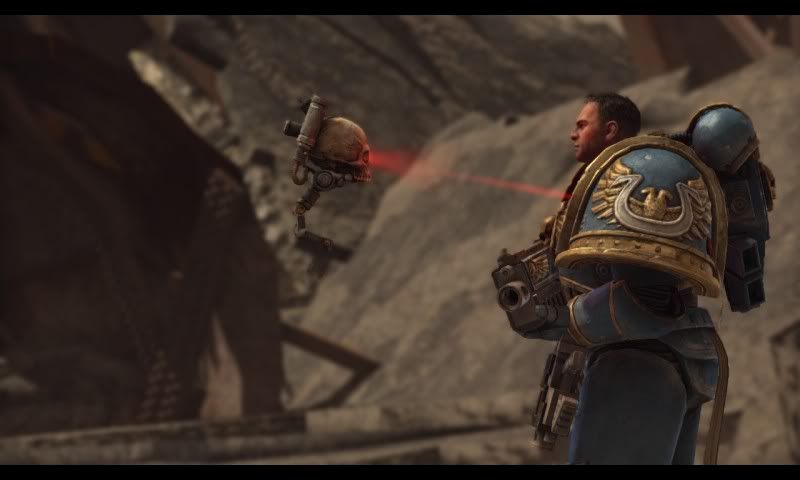
Pictured: James Vega twenty years after the 'liberation' of Earth. But even beyond
this issue there's one even more personal. The
Normandy has been our home for three games, moreso in the last two. The final game even makes an effort to put a more lived-in feel into the ship, with crew members wandering around and conversing freely with one another without our prompting. This ship and her crew have been there for Shepard through thick and thin. They flew through the Omega-4 relay in
Mass Effect 2 knowing it was a suicide mission. In fact, at the start of
Mass Effect 3, the ship was grounded. To get to Shepard as quickly as they did, the
Normandy had to have already been airborne when the Reapers hit. They knew what was coming and they knew their commander needed them. And yet at the very end, when Earth is on the cusp of rescue and their leader making a dire and perhaps final choice, what do they do? Apparently, according to BioWare, they tuck tail and run as fast as they can. It's possible they didn't know about the space magic that would keep the mass relay explosion from killing them all, and were trying to escape before what happened to Bahak happened to Sol. I still don't get that, though. They're not just abandoning Shepard but the entire planet they just helped liberate. And how would they know it was coming? Their motivations for running are unexplained and nebulous. You do see some of them living after the whole outrunning-the-explosion bit if you had enough war assets, but again, logic comes and bites whatever happiness you can get from this stupidity right in the ass. If Garrus or Tali survived, what happens when the humans run out of dextro-friendly food? If Liara survived, how do you think she's going to like living out her long life on this planet while every other person she survived with dies around her? They're stranded, and with the mass relays destroyed and given the distance Joker probably jumped, chances of rescue are slim to none. To me it would make more sense if the
Normandy was caught in the blast from the relay and Joker has to struggle to keep her aloft long enough to land safely on Earth. And when they do land, depending on the war assets, either they're all killed, they survived but the battle wiped everybody else out, or they survived and are hailed as heroes... with the notable and palpable absence of Shepard. But hey, what do I know, I don't write for BioWare.
The Biggest Tragedy Of All
The worst part of the endings has nothing to do with the decisions themselves or the gaping holes in the plot through which one could fly the
Normandy. The worst part is how the ending of
Mass Effect 3 renders every decision you've made over the 150+ hours spent across the trilogy completely inconsequential. It doesn't matter if you cured the genophage, brokered the peace that ends a centuries-long race war or even how many lives you save or change just by being Shepard. In the end it all comes down to different colored explosions that basically give you the same results. Stories have done the "what you choose doesn't matter" ending before, and it's been effective.
Brazil and
12 Monkeys spring to mind. But those were films. These are video games. Moreover, the
Mass Effect series are video games that emphasize player choice, tolerance, examinations of individuality and life itself. We are told, and invited to exemplify through gameplay, that the choices we make matter, that the direction lives take are important, and that tolerance and peace are not only possible, they are preferable to the alternatives even in our current, modern day lives. A world where different species can form friendships and even romances without any serious social implications and a man can talk about his husband in a very real and moving way is one that is definitely worth dying for. But Shepard's death, just like our choices, really has no meaning. I mentioned before that there's no sense of closure. There's also no sense of gravity to our decisions. We have no idea if the alliances we've forged, the peace we've brokered, will last beyond the multi-colored explosions we create. And in the end, we're given to understand that it really doesn't matter. To make everything in all three games come down to a single choice could work, if the aftermath of that choice also reflects choices we've made since the beginning. As it stands, those decisions carry no weight. Even in the case of the 'best' ending, there's no sense that what we did was ultimately worthwhile. The whole trilogy, from who to rescue on Virmire to the events on Thessia, feels like a waste of time, because no matter what we do, the completely interchangeable endings are waiting for us. It's one thing to botch the ending of a video game. It's another to ruin its replay value as a result, and another still to also destroy the replay value of the games that came before it. As a writer and a gamer, I simply cannot grok this decision. I'm fine with Shepard dying. Just as I was with Spock dying in
Wrath of Khan. It's all a question of the how and why behind that death. If BioWare do indeed heed the criticism of their fans, there's no reason to simply push them into a "happy" ending. But the ending should mean something. It should have an effect on us other than anger. We should feel our time was well-spent, and worth spending again. Even if the end is bittersweet or downright tragic, if it's satisfying enough it will be worthwhile, perhaps even to the point of repetition. People watch
The Lord of the Rings trilogy and all of those
Star Wars films multiple times, even if the ending isn't entirely happy, because the world is still rich and full of life and meaning after the end. As it stands now, the
Mass Effect universe is left empty. Shepard's death is essentially meaningless. Shakespeare put it best: "
It is a tale told by an idiot, full of sound and fury, signifying nothing." This post may be similar, in the end. I have no idea if BioWare is actually listening. But even if they aren't, if you've gotten this far and are still reading, I thank you for your time. I welcome other thoughts on this matter. And I pray that I never, ever botch the ending of anything I write this badly.
Blue Ink Alchemy


